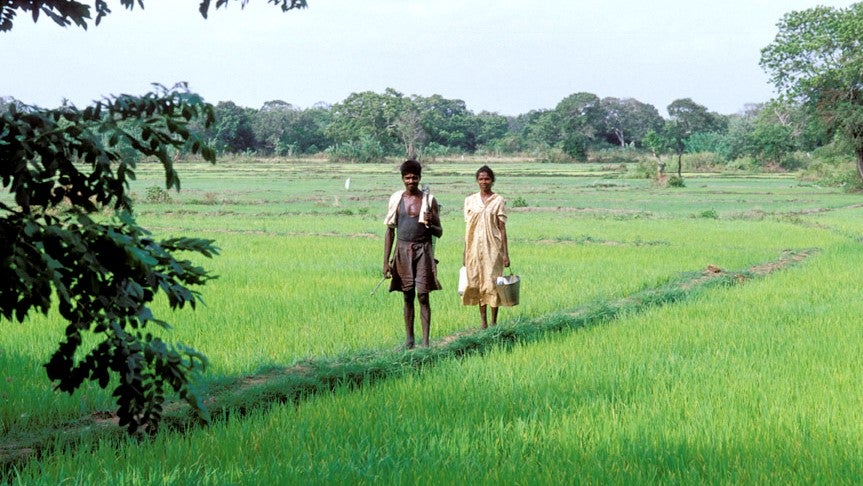 Farmers in a paddy field in Sri Lanka. When the government moved to use some of the water from an state-managed irrigation reservoir for drinking purposes, farmers protested. © Dominic Sansoni / World Bank
Farmers in a paddy field in Sri Lanka. When the government moved to use some of the water from an state-managed irrigation reservoir for drinking purposes, farmers protested. © Dominic Sansoni / World Bank
(Guest blog) - A central question in fragility discourse is: how do we move from societies based on closed, exclusionary political settlements to societies that are more inclusive, just and peaceful? Currently there are two major reports that attempt to describe roadmaps towards more peaceful and inclusive societies; the Fragility Commission's “Escaping the Fragility Trap” and the World Bank and UN’s “Pathways for Peace” report.
Both reports argue for the need to build state legitimacy through achieving certain outcomes or promoting fair processes, often through service delivery. The Pathways report uses findings from the first phase of the Secure Livelihoods Research Consortium*, an eight-year, cross-country research programme, to make this case. Based on findings from the 2nd phase of this research programme, we now think that this understanding of state legitimacy is misleading for international development programmes and their efforts to support a transition to more peaceful societies.
Beyond outcomes and process legitimacy
Both the Commission and the UN/World Bank’s report rely on a transactional understanding of state legitimacy: if the state achieves certain outcomes (e.g. delivers services) and these outcomes are achieved according to processes that the population perceive as right (e.g. services are delivered fairly), then citizens will accept the authority of the state.
In the first phase of research, we found mixed evidence to support this view. Based on data collected from two rounds of a large N survey in conflict-affected areas of Pakistan, Nepal, Sri Lanka, Uganda and DRC, we found no relationship between increased access to services and perceptions of government and a weak relationship between increases in satisfaction and perceptions of government. In Uganda, increased satisfaction with health services translated into improved perceptions of government but this did not hold for other services. In the four other countries, we did not find that an increase in satisfaction with services led to improved perceptions of government. Having access to a grievance mechanism seemed to be a better predictor of improvement in perceptions of government but even this wasn’t always the case.
When we published the results from the survey, we argued that perceptions of government are influenced not just by whether people can access a service, but also by how a service is delivered . In other words, we promoted an understanding of state legitimacy as based on both outcomes and processes, which donor agencies, such as DFID and the UN, picked up on.
But we weren’t quite happy with our conclusions. We couldn’t explain why outcomes mattered in the health service in Uganda but not in the other countries. While process mattered in two countries, we didn’t find a strong effect for the presence of grievance mechanisms in Pakistan and DRC. It seemed that outcomes and process only mattered in certain contexts.
A Constructivist Turn
During the second phase of research, we decided to go back to three of the countries in which the survey had been carried out (Sri Lanka, Pakistan and Nepal) and carry out more in-depth qualitative research. A third round of the survey was also carried out in two of these countries (Pakistan and Nepal).
Influenced by our partners in the Global South, we were able to access processes of state legitimation that were much more co-constructed by citizens and state agents than we had previously imagined . We found that state legitimacy was based on a fluid dynamic between people’s beliefs about how state power should be exerted and by people’s experience of the state . Yet, instead of people’s expectations and experience of the state simply “matching-up” to produce state legitimacy, we found that that state and societal groups co-constructed these expectations and how experiences are perceived.
For example in Rajanganaya, in North Central Province, Sri Lanka, we found that paddy farmers’ beliefs about how state power should be exerted were influenced by having a livelihood that depended on a state-managed irrigation system (which created a group identity) and state narratives that promoted the notion of the paddy farmer as epitomizing the essence of Sri Lankan identity.
When the state moved to use some of the water from the irrigation reservoir for drinking purposes, farmers protested. Even though the state moved to introduce more inclusive access to drinking water, and to potentially improve its performance for a wider group of citizens, this action actually instigated protests from paddy farmers.
The farmers’ push back was partly due to how normatively (and politically) embedded they perceived their group role in enabling the state of Sri Lanka to exist (through their production of rice), but also due to how the state elevated the lived-experience of farmers as representing the essence of the Sri Lankan identity, creating a co-constructed ideology of the state that the farmers could protest if the state did not support.
Construction and Contestability as New Sites for Understanding State Legitimacy
Not only did we find that the process of state legitimation was co-constructed, we also found that particular services only became salient in the construction of legitimacy if they (re)produced contested distribution arrangements .
In the 1960s in Swat, Pakistan, land was owned and controlled by a minority elite who belonged to the ethnically Pashtun group called the Yusufzai. At this time, Swat was an authoritarian ‘mini-state’ within Pakistan, ruled by a governor with the support of certain Yusufzai families. In 1969, Swat became part of democratic Pakistan but the informal rules governing land ownership remained in place.
In 1970, influenced by the spread of socialism and recognising the widespread support for land reform, Z.A Bhutto campaigned on this, won the elections and passed land reforms regulation. In Swat, the old rules governing who could or could not own land clashed with President Bhutto’s political and ideological narrative and changing beliefs among the lower castes.
Expecting Bhutto’s land reforms to be implemented, tenants stopped paying rent and there were widespread armed confrontations between landlords and tenants. Tenants’ beliefs about how state power should be legitimately exerted were co-constructed by narratives promoted by a new government but also influenced by their membership of lower castes.
What’s interesting about this case is that at the time of the protests, there were relatively good basic services in Swat, including free healthcare and education. However, neither education or education were salient issues in the negotiation of legitimacy. Rather the right to own land had become the state function that people were willing to take up arms about. Land tenure policies continue to be a salient issue in how the state is (de)legitimated in Swat. During the 2008 Taliban uprising, the Taliban highlighted land distribution as evidence of an unjust state and offered land confiscated from Yusufzai families to those who were willing to support them.
Rethinking State Legitimacy
Instead of focusing on the process of service delivery and increasing people’s perceptions of fairness across all services, it may be more strategic to identify which service(s) is salient in the construction of legitimacy and focus resources on addressing the contested issue in the delivery of that service. There is much in the Pathways and Fragility Commission reports that would align with this approach, including on the significance of narratives, inter-group contestation and social norms underpinning institutional reform and state legitimacy. It cannot be overstated that funding basic services, even if they are not salient in the construction of legitimacy, remains critical for human development.
In February 2020, we will publish a think piece that will lay out in more detail how our thinking about state legitimacy ties in with the latest developments in political settlement theory and how programmes can work with these dynamics to support state legitimacy. In the meantime, we are keen to hear others’ experiences of trying to strengthen state legitimacy in fragile states. Have you observed a disconnect between improved state performance on the one hand, and negative perceptions of state legitimacy on the other? Has the transactional approach to understanding state legitimacy produced intended results?



Join the Conversation